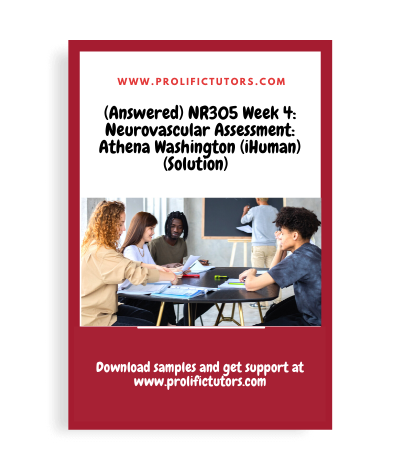(Answered) NR305 Week 4: Neurovascular Assessment: Athena Washington (iHuman) (Solution)
September 28, 2021 2023-03-29 16:46(Answered) NR305 Week 4: Neurovascular Assessment: Athena Washington (iHuman) (Solution)

(Answered) NR305 Week 4: Neurovascular Assessment: Athena Washington (iHuman) (Solution)
Directions
(Looking for the full course solution? Check this discounted offer – [BEST DEAL] – NR305 Complete Week 1-8 Study Guide with Questions and Answers for iHuman Revision – Latest – Contains all iHuman Assessments and their verified answers).
The following are the instructions for the paper. Follow them keenly to answer the question.
- Access the Athena Washington Case Assignment in iHuman by clicking on the “Load Assignment in a New Window” button at the bottom of this assignment page. If prompted, select to load the case in a new browser window.
- Note: It may take a few moments for iHuman cases to load in your web browser, so please be patient.
- Complete the prework questions associated with the case. Prework is required to be completed before you can move on or before you can replay a case. Be sure that you have submitted each pre-work exercise for evaluation before you move on to the next. Your answers are not graded but are intended to get you thinking about the case.
- Begin the case and complete these sections: (100 points total, immediate feedback/grade will be provided to you by iHuman when complete)
- EHR Review
- Health History
- Physical Assessment
- Note: there is no time limit on completing cases
- As you move through your first attempt and once you complete the case, you will receive feedback from the “Expert” on the important findings that you included (or should have included), and information that should have been collected on the health history and physical assessment. The system will also tell you if you asked questions or performed assessments that are considered extraneous or inappropriate for that particular case. Review this information carefully and take notes to be used on your second attempt, if you would like to work toward a higher score.
- If you must leave the case for any reason before you have totally completed it, the program will save your spot and will return you to the same point when you re-enter the case. (Look for the green “Resume” arrow at the bottom of the screen.) If you had fully completed a section, you will be able to review the section, but you will not be able to change your answers. You will only be able to move forward in the case.
- Type your responses to the questions in the Nurse Notes section in the box provided (50 points, graded by instructor after submission). The Nurse Notes will be graded by your instructor, not iHuman. See the grading rubric to understand how it is evaluated. Note: You only need to type out the Nurse Notes once. Your instructor can see both attempts. If you make revisions on your second attempt, inform your instructor.
- When you have completed a case review the final score and feedback provided by iHuman. You have the option to complete this case a second time before the submission deadline (total of 2 attempts) to improve your score. Your instructor will convert your highest score in iHuman to points earned in the grading rubric. Scores are adjusted based on your performance level.

Need any further help with an i-Human case? Talk to us via the chat window or email us directly from our homepage.
Now for just $10.99
Solution/Answer
This is part of the answer to the Anthena Washington i-Human case above. Get the comprehensive answer including case documentation HERE.
We also have solutions to a lot of the i-Human cases.
SABR note
Situation
Ms. Washington is a 48-year-old African American woman. She was brought to the ED by her husband after experiencing stroke-like symptoms such as severe pounding headache, slurred speech, and disorientation. She has signs of neurological deficit and left side weakness. PT has never been hospitalized and has a history of hypertension and hypercholesterolemia. The patient is Alert and Oriented x 3. No Known allergies and full code. During head-to-toe assessment noted left side facial drooping, left-sided weakness in arms and legs. Moderate dysarthria present and slurred speech. Good respiratory effort, lungs clear in all fields, chest expansion symmetric. NIH Stroke Scale score of 11. The patient is not agitated or hostile towards others.
VS-T 98.6, BP 184/106, P 110, R-22, 02 97% (RA).
Background
Ms. Washington came home from work last night with a severe headache and took Tylenol. At 05:00, she woke up with slurred speech and disoriented. Her husband called the EMS and she was brought to the ED.
Assessment
Ms. Washington has stroke-like symptoms such as slurred speech, and disorientation. Her physical symptoms include left-face drooling, generalized left side weakness, and limited range of motion to her left arm and leg. The patient is also oriented to self and husband. Her NIH Stroke Scale score IS 11. She is also unable to maintain her leg in the air. She has moderate dysarthria. Her medical history includes hypertension and hypercholesterolemia which she controls using Metoprolol, Simvastatin, and Acetaminophen. Her CT scan lab results show no Haemorrhage for stroke.
EHR Review
| Electronic Health Record (EHR) Review | Patient (Athena Washington) Issue |
| EHR Review: Dysarthria – This is a difficulty in articulating words or speaking due to weakness of muscles that help to speak. These muscles could be paralyzed. | Central nervous system – A problem with the central nervous system that causes damage to the nerves. In this case, it could be that the nerves that control muscles supporting speech are not functioning properly. |
| EHR Review: Hypertension – There is increased blood pressure (BP). Such a rise in BP can be attributed to many factors throughout the body. | Endocrine/ Hormonal Regulation – In the case of Athena Washington, the increase in blood pressure is likely due to the activity of the renin-angiotensin-aldosterone system. The renin-angiotensin-aldosterone controls arterial pressure and volume homeostasis, via the angiotensin-converting enzyme (ACE) inhibitors. |
| EHR Review: Weakness on the left side. | Mobility/Immobility, Rest, and Activity – Athena has a problem with the nervous system which could be affecting the ability to conduct the routine activities of day-to-day life without assistance. Such assistance should be accorded to various extents as necessary and depending on the amount of weakness. |
| EHR Review: An irregular/abnormal score on the Stroke Scale from NIH (National Institute of Health). | The central nervous system – possible ischemia in the brain where there could be a restriction in blood supply. The result is inhibited neurological functions like level of consciousness, motor, and sensory functions. The patient’s reaction is dependent on the severity of ischemia. |
| EHR Review: There is drool on the left side of the face. This shows weak facial muscles or paralysis on the muscles hence problems with the intake of food or drinks. | Fluids and Electrolytes – The problems in chewing, swallowing, and drinking may affect Fluids and Electrolytes processes critical in homeostasis and that control critical functions in the body like cardiac, neuro, oxygen delivery, balancing of acids and bases, among others. |
| EHR Review: There is a need for an NIHSS (National Institutes of Health Stroke Scale) re-assessment. | Cognition – the NIHSS values will allow for evaluation of any improvements in their conditions |
| EHR Review: Tachycardia – Heart rate elevated to over 100 beats per minute (BPM) | Acid-base imbalance – Tachycardia can be due to a combination of acid-base and electrolyte imbalances that elevate the heart rate. The patient could be having a case of acidosis which would show via a low Ph value in their blood. |
| EHR Review: Nausea – Feeling uneasy and discomfort associated with likelihood to vomit. This could be due to a chemical imbalance in the gastrointestinal tract or general problems with the digestive system. | Comfort – a persistent discomfort and uneasiness. Especially discomfort in the back of the throat, the chest, or the top part of the stomach. Aversion to eating and the feeling of vomiting also exacerbate the problem. |
| EHR Review: Headache – experiencing pain in the head, face, or neck. The pain can be throbbing, constant, sharp, or dull. | Comfort – a painful face, neck, or head causes discomfort in the patient especially when prolonged. |
| EHR Review: No Swallow Screen pass – the Swallow Screen test to check for dysphagia will show problems with ingestion. | Fluids and Electrolytes – due to difficulty in chewing, swallowing and drinking. |
Now for just $10.99
EHR Review (with time)
A further summary that includes the time change of diagnosis is as below.
| Record Review and findings | Change of diagnosis in time | Cause of the issue |
| Facial drool (left side) | Unchanged | Mobility or activity or rest |
| Swallow screen fail | Acute/Severe | Problem with the central nervous system |
| Arm and leg (left side) weakness | Unchanged | Mobility or activity or rest |
| Nausea | Acute/Severe | Problem with fluids and electrolytes |
| Dysarthria | Acute/Severe | Problem with the central nervous system |
| Hypertension signs | Acute/Severe | Problem with fluids and electrolytes |
| Abnormal NIH scale | Acute/Severe | Mobility or activity or rest |
| NIHSS (reassessment) | Acute/Severe | Mobility or activity or rest |
| Headache | Acute/Severe | Comfort/Discomfort |
You can also get a similar answer CUSTOMIZED for you by ordering here – https://prolifictutors.com/place-order/
Now for just $10.99
See also:

![[Solved] ENGL147N - Week 7 Assignment- Final Draft of the Argument Research Paper](https://prolifictutors.com/wp-content/uploads/2023/01/Solved-ENGL147N-Week-7-Assignment-Final-Draft-of-the-Argument-Research-Paper--240x142.png)
![[Solution] - NR305 - Week 3 Discussion: Debriefing of the Week 2 iHuman Wellness Assignment (Graded](https://prolifictutors.com/wp-content/uploads/2022/06/Best-Answer-NR305-Week-3-Discussion-Debriefing-of-the-Week-2-iHuman-Wellness-Assignment-Graded--240x142.png)

![[Best Answer] NR305 - Week 2 Discussion: Reflection on the Nurse’s Role in Health Assessment (Graded)](https://prolifictutors.com/wp-content/uploads/2022/06/Best-Answer-NR305-Week-2-Discussion-Reflection-on-the-Nurses-Role-in-Health-Assessment-Graded-240x142.png)
![[Best Answer] NR305 - Week 2 Assignment: Wellness Assessment: Luciana Gonzalez (iHuman) (Graded)](https://prolifictutors.com/wp-content/uploads/2022/06/Best-Answer-NR305-Week-2-Assignment-Wellness-Assessment-Luciana-Gonzalez-iHuman-Graded--240x142.png)

